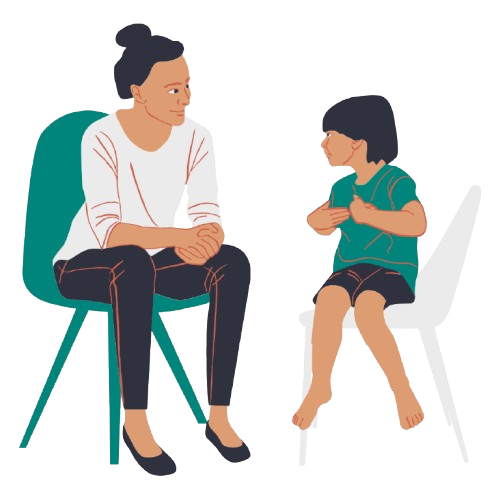Watch a sample from our training module on anxiety.
Inside Autism:
Practical, Neuroaffirming Training for Professionals — and the Teams Who Support Them
Whether you work directly with Autistic children — or lead a team who does — you know how complex this support can be.
Inside Autism offers practical, real-world tools for professionals navigating those moments when behaviour doesn’t make sense, emotions run high, and everyone’s doing their best with what they’ve got.

Neuroaffirming. Trauma-informed. Grounded in lived and professional experience.
It’s designed for:
- OTs, educators, psychologists, support workers, and coaches
- Team leaders and service providers seeking consistent, confident support across their organisation
You’ll get:
- Tools you can use in the moment (not just theory)
- Deeper insight into nervous systems, perception, and communication
- Strategies that build trust, reduce escalation, and support meaningful growth
- 3 x Monthly Live Q&A Zoom calls for to workshop real-time cases and get professional support
We know what it’s like when…
Your team has training — but still feels unsure
Everyone’s doing their best, but there’s still confusion and inconsistency.
You want to move beyond “behaviour management”
To something that actually supports regulation, safety, and growth.
You’re trying to respond — not be reactive
But the behaviours are complex, and the usual tools aren’t working.
Burnout is high, and regulation is low
Your people are stretched thin — and it’s hard to stay steady.
You’re leading a team — but carrying a lot
And you need training that makes your job easier, not more complicated.
Whether you’re a frontline professional or a team leader, you deserve training that’s practical, respectful, and truly useful — for every child and every staff member.
Imagine This…
What if the way you respond to Autistic children helped them feel safer, seen, and supported — not more stressed?
What if your team shared a common language — and it actually worked in practice?
Here’s what Inside Autism can offer:

For Professionals:
- Less second-guessing — more clarity on what’s actually helpful
- Practical ways to reduce stress (for you and the child)
- A shared language to use across your team or workplace
- Feel more aligned with your values, not just your policies

For Children:
- Environments that feel safer and more predictable
- Adults who understand what’s behind the behaviour
- Fewer power struggles, more moments of connection
- Support that builds trust instead of control

For Organisations:
- More consistent practices across your staff
- Less burnout from trial-and-error strategies
- A culture that’s trauma-aware, neuroaffirming, and child-centred
- Training that actually sticks — and improves team cohesion
A Real-World Framework That Shifts How You See, Respond, and Support
Inside Autism is built on the S.U.P.E.R. Model — a simple, powerful framework that helps professionals support Autistic children in ways that reduce stress, build trust, and create meaningful change.
Here’s what you’ll learn:
S – Self-awareness
Understand how your own belief systems and nervous system reactions influence how you support — so you can respond with more steadiness and less reactivity.
U – Understanding
Explore the Autistic brain, sensory processing, trauma, demand avoidance (including PDA), and behaviour through a relational, neuroaffirming lens.
P – Prepare, Plan, Teach
Move from reacting to teaching. Learn how to proactively build skills and understanding that reduce escalation over time.
E – Environment & Culture
Shape physical and emotional environments that feel safer for everyone — with more predictability, less pressure, and greater calm.
R – Relationship & Rapport
Build genuine trust, connection, and co-regulation — and repair after ruptures in ways that honour both the child and the professional.
Core Topics Covered
- Autism as a neurotype (not a problem to fix)
- The nervous system and stress response (fight, flight, freeze)
- Sensory processing and how it shapes behaviour
- Demand avoidance (including PDA) and power struggles
- Meltdowns, shutdowns, and misunderstood “tantrums”
- Trauma-informed support and emotional safety
- Regulation and co-regulation as a foundation for growth
- Strategies that reduce escalation and build trust

Choose the Tier That Fits Your Needs
Whether you’re learning for yourself or leading a team, Inside Autism offers flexible options designed for real-world schedules, budgets, and service demands.
Tier 1:
Self-Paced — Individual Access (or Teams up to 9)
$340 + GST per person
For individual professionals or small groups who want flexibility with structure.
- 6.75 hours of practical, neuroaffirming training
- Live Group Q&A Calls (New!)
- Includes access to **3 x live monthly Zoom Q&A sessions**, held on the 2nd Friday at 12:30pm (Sydney/Melbourne time). These are **open calls for all current participants**, offering a space to bring questions, hear case reflections, and deepen your learning together
- 12 months’ access to all modules, audio versions, and downloadable tools
- Trackable progress for team leaders
- Learn anytime, anywhere — self-paced, at your own rhythm
- Includes a PD certificate for professional development or CPD recognition
Perfect for educators, OTs, support workers, allied health professionals and more.
Tier 2:
Self-Paced — Group Access (10+ Participants)
$296 + GST per person
Built for organisations wanting consistent, low-disruption training across larger teams.
- Same inclusions as Tier 1, plus:
- Live Group Q&A Calls (New!)
- Includes access to **3 x live monthly Zoom Q&A sessions**, held on the 2nd Friday at 12:30pm (Sydney/Melbourne time). These are **open calls for all current participants**, offering a space to bring questions, hear case reflections, and deepen your learning together
- Bulk enrolment and group dashboard
- Ideal for schools, NDIS providers, early years services, community centres
- Fits around shifts, caseloads, and service delivery demands while also receiving professional support to apply knowledge and workshop real situations.
- Each participant receives a PD certificate upon completion
Tier 3:
Live Online Workshop (Open Enrolment)
$595 + GST per person
For professionals who value live learning, interaction, and reflection.
- Two full-day Zoom sessions - 6 hours each + breaks (9am to 4.30pm, includes 60min lunch break + two 15-min breaks)
- Upcoming date: 4th & 5th December, 2025
- Facilitated by Safe to Grow founder Jackie Hall
- Includes breakout rooms, real-world case studies, and group discussion
- PD certificate provided for full participation
Looking for Something Tailored?
We offer custom training packages designed to meet your team’s unique needs:
- Live online, face-to-face, or hybrid delivery
- Optional follow-up support via webinars
- Can be delivered in shorter sessions across multiple days
- Minimum of 15 participants per live session
- All participants receive PD certificates
We’ll help you shape a training format that fits your people, context, and goals.
What’s Included in Tier 1 & 2
Whether you’re enrolling as an individual or registering your whole team, every option includes:
Here’s what you’ll learn:
Engaging, Evidence-Based Video Modules
Bite-sized, easy-to-follow videos grounded in neuroscience and neuroaffirming practices — filled with practical tools you can use straight away.
Downloadable Key Slides & Diagrams
A PDF of the core slides and visuals — ideal for quick reference, printing, or sharing during team meetings.
Professional Development Certificate
Issued on completion and includes hours, topics covered, and alignment with CPD requirements for most professions.
Team Progress Tracking
Admin dashboard so team leaders can track module completion and team progress.
Flexible Access
All online modules are fully self-paced. Learn when it suits you, on any device — no special apps or logins needed.
Monthly Live Q&A for Tiers 1 & 2
Join a live group call with facilitator and creator Jackie Hall on the 2nd Friday of every month. Ask questions, share insights, and continue learning in real time. (Access for 3 months),
What's included in Tier 3 - Live Online Workshop?
This format is perfect if you learn best through conversation, reflection, and collaboration — and want to leave with tools you can apply straight away.

The Live Online Workshop is more than just training. It’s two immersive days where you get to:
- Learn alongside other professionals who are facing similar challenges
- Ask questions in real time — and get answers grounded in experience
- Reflect on your own practice in a safe, guided environment
- Explore real-world case studies and breakout discussions that make the learning stick
- Get a deeper understanding of complex behaviours — and how to respond with clarity and confidence
Whether you’re new to this work or want to deepen your neuroaffirming lens, you’ll walk away feeling more equipped, more connected, and more confident



Frequently Asked Questions
Who is this training suitable for?
Inside Autism is designed for educators, OTs, speech therapists, psychologists, support workers, child care professionals, coaches, and anyone working with Autistic children. You don’t need prior autism-specific training — just a willingness to learn.
How do I know which tier is right for me (or my team)?
If you’re learning on your own or part of a small team (up to 10), Tier 1 is a great fit. It’s fully self-paced, flexible around your schedule, and includes access to three live Q&A calls where you can ask questions and learn from others.
Running a larger team? Tier 2 makes it easy to roll out consistent, neuroaffirming training across your organisation. You’ll get bulk enrolment, a team dashboard, and access to the same monthly group Q&A calls — ideal for ongoing support without disrupting service delivery.
Prefer live, interactive learning? Tier 3 is for you. It includes two full days of guided Zoom training (next session: October 16–17), complete with breakout rooms, real-time discussion, and expert facilitation. It’s a deeper dive for professionals who want to reflect, connect, and walk away with immediate tools to use.
Still unsure? [Contact us] — we’re happy to help.
Is the training certified?
Yes. All participants receive a PD certificate upon completion, which includes hours, content covered, and learning outcomes — suitable for most professional CPD requirements.
How do I access the training?
You’ll receive login details to our online learning portal. All content is fully self-paced (except for Tier 3), mobile-friendly, and doesn’t require any special software.
Can I monitor my team’s progress?
Yes — if you’re enrolling a team (Tier 1 or 2), you’ll receive access to a dashboard where you can track completion status across your staff.
Can I upgrade later if I choose the wrong tier?
Absolutely. If you start with a self-paced tier and decide to move to live training or a larger group package, we can arrange that. Just reach out to us.
Do you offer payment plans or invoicing for teams?
Yes. We can issue invoices for organisations and offer flexible payment options for group enrolments. Just contact us to chat through what you need.
Testimonials
Ready to Support Autistic Children with Insight, Heart and Real-World Tools?
You don’t have to figure it out on your own.
Inside Autism gives you the understanding, strategies and support to show up in ways that are grounded, respectful, and actually work — for the child and for you.
Whether you’re learning for yourself or leading a team, we’ll help you choose the right path forward.
👇 Choose your next step:
Explore the different ways you (or your team) can start learning today.
We’ll help you figure out the best option based on your needs and goals.
